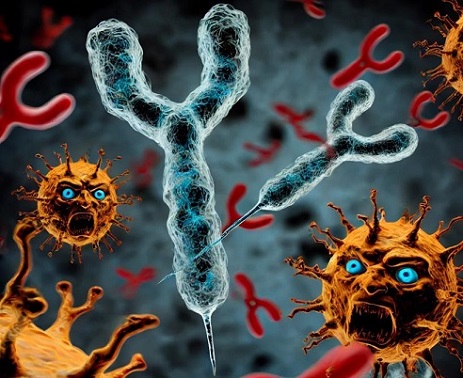Columbia study reveals alarming resistance of KP.3.1.1 variant to America’s last monoclonal antibody defense
Nikhil Prasad Fact checked by:Thailand Medical News Team Aug 14, 2024 8 months, 6 days, 11 hours, 33 minutes ago
Medical News: In a concerning development, researchers from the Columbia University Vagelos College of Physicians and Surgeons have uncovered that the rapidly spreading KP.3.1.1 sublineage of SARS-CoV-2 exhibits significant resistance to Pemivibart, the last remaining monoclonal antibody authorized for use in the United States. This
Medical News report delves into the implications of this discovery, highlighting the urgent need for new antiviral strategies as the virus continues to evolve.
 Columbia study reveals alarming resistance of KP.3.1.1 variant to America’s last monoclonal antibody defense
Columbia study reveals alarming resistance of KP.3.1.1 variant to America’s last monoclonal antibody defense
Image - AI generated By TMN
The Last Line of Defense Under Threat
In March 2024, the U.S. Food and Drug Administration (FDA) granted an Emergency Use Authorization for Pemivibart (marketed as Permagard or VYD222), a monoclonal antibody engineered to provide pre-exposure prophylaxis for COVID-19, particularly for immunocompromised individuals. These individuals are often unable to mount a sufficient immune response to vaccines, making Pemivibart a crucial line of defense.
However, SARS-CoV-2 has not remained static. Since the emergence of the Omicron variant, the virus has continued to mutate, leading to the development of several sublineages. The KP.3.1.1 sublineage, in particular, has been spreading rapidly, raising concerns among the scientific community.
Study Findings: A Worrying Decline in Efficacy
The study, conducted by a team at Columbia University’s Aaron Diamond AIDS Research Center and published in the peer-reviewed journal [Journal Name], set out to assess the neutralizing activity of Pemivibart against various SARS-CoV-2 sublineages, including KP.2, KP.3, KP.2.3, LB.1, and the rapidly expanding KP.3.1.1. Using a series of in vitro neutralization assays, the researchers found that while Pemivibart retained its efficacy against some sublineages like JN.1 and KP.2, its potency was significantly reduced against others, most notably KP.3.1.1.
Critically, the study revealed that the 50% inhibitory concentration (IC50) of Pemivibart against KP.3.1.1 was approximately 6 µg/mL, a staggering 32.7-fold increase compared to its activity against the JN.1 sublineage. This substantial decrease in neutralizing ability suggests that KP.3.1.1 has developed mutations that allow it to evade the protective effects of Pemivibart, making it far less effective in combating this particular strain.
Understanding the Mutations: How KP.3.1.1 Evades Pemivibart
The researchers identified specific mutations in the spike protein of KP.3.1.1 that contribute to its resistance to Pemivibart. Two key mutations were highlighted: Q493E and the S31 deletion (S31∆). The Q493E mutation, although not directly within the binding site of Pemivibart, appears to increase the virus's affinity for the ACE2 receptor, potentially through an epistatic effect with the F456L mutation. This enhanced binding abili
ty likely contributes to the reduced effectiveness of Pemivibart.
The S31∆ mutation, however, had an even more pronounced impact on the monoclonal antibody’s neutralizing activity. This mutation, which results in the deletion of a small segment of the spike protein, seems to alter the structure of the N-terminal domain (NTD) in a way that interferes with the antibody’s ability to bind effectively. Additionally, this mutation creates a new glycosylation site at N30, which could further hinder the binding of antibodies not only from Pemivibart but potentially from natural immune responses as well.
Implications for Public Health: A Call to Action
The findings of this study have significant implications for public health, particularly for the millions of immunocompromised individuals who rely on Pemivibart for protection against COVID-19. As KP.3.1.1 continues to spread globally, the effectiveness of this monoclonal antibody is being called into question.
“This study findings highlight the critical need for continuous monitoring of the clinical efficacy of Pemivibart, as well as the urgent need to develop new antiviral agents that can keep pace with the evolving virus,” said the lead researcher, Dr David D. Ho. The study's results underscore the importance of expanding the arsenal of preventive and therapeutic options available to combat COVID-19, especially as the virus continues to adapt and overcome current treatments.
Conclusion: The Road Ahead
As the KP.3.1.1 sublineage of SARS-CoV-2 gains ground, the findings from Columbia University serve as a stark reminder of the challenges we face in the ongoing battle against COVID-19. The reduced effectiveness of Pemivibart against this variant highlights the dynamic nature of the virus and the need for a proactive approach in developing new treatments and preventive measures.
The study also emphasizes the importance of ongoing research and surveillance to identify and respond to emerging threats promptly. With the virus showing no signs of slowing down its evolution, the scientific community must continue to innovate and adapt to protect vulnerable populations.
The study findings were published on a preprint server and is currently being peer reviewed.
https://www.biorxiv.org/content/10.1101/2024.08.12.607496v1
For the latest COVID-19 News, keep on logging to Thailand
Medical News.
Read Also
:
https://www.thailandmedical.news/news/new-influenza-strain-showing-resistance-to-popular-antiviral-drug-emerges
https://www.thailandmedical.news/news/what-s-happening-in-karachi-pakistan-hiv-cases-rising-exponentially-and-more-incidences-of-drug-resistant-hiv-infections-emerging
